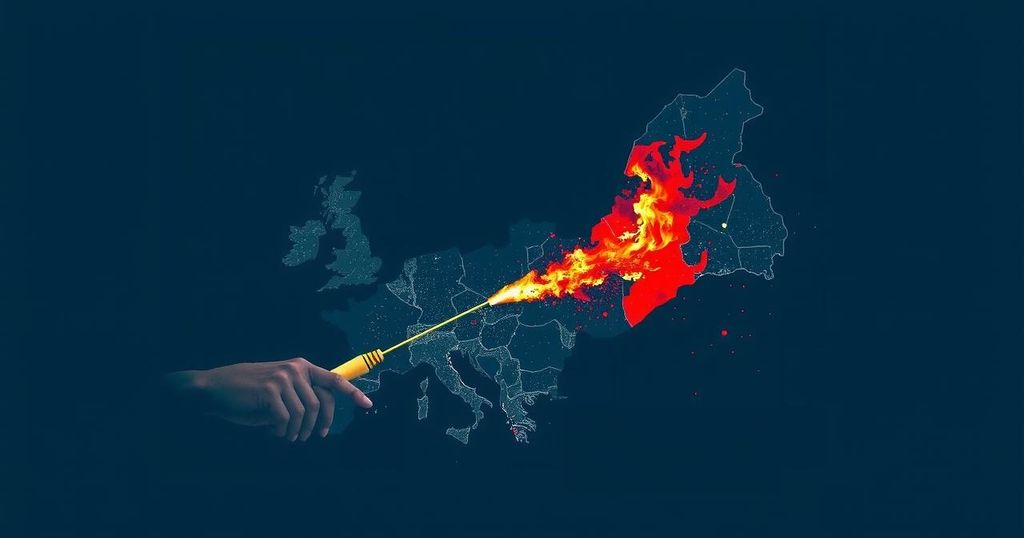Egyptian President Abdel Fattah el-Sisi has proposed a two-day cease-fire in Gaza, seeking an exchange of four Israeli hostages held by Hamas for Palestinian prisoners. This initiative comes amid escalating violence, with recent Israeli airstrikes resulting in numerous Palestinian fatalities. The proposal emphasizes resuming negotiations toward a lasting resolution within ten days, reflecting ongoing international mediation efforts.
On Sunday, Egyptian President Abdel Fattah el-Sisi put forth a proposal for a two-day cease-fire in Gaza, aimed at facilitating a hostage-prisoner exchange involving four Israeli hostages currently held by Hamas in return for Palestinian prisoners. This suggestion emerged during a press conference in Cairo, where President el-Sisi was accompanied by Algerian President Abdelmadjid Tebboune. The backdrop of this proposal includes ongoing Israeli military operations which have claimed the lives of at least 45 Palestinians in recent strikes across the territory. President el-Sisi indicated that negotiations should recommence within ten days following the implementation of the proposed cease-fire, with aspirations toward establishing a permanent resolution to the conflict. His announcement coincides with renewed discussions in Qatar, featuring high-profile representatives from the CIA and Israeli Mossad, tasked with mediating the crisis. While there has been no immediate reaction from Israeli or Hamas officials, a Palestinian representative engaged in the negotiations expressed a belief that Hamas might be receptive to this new approach, stipulating that any agreement must precede with an end to the ongoing military conflict and the withdrawal of Israeli forces from Gaza. Israel maintains that the ongoing conflict cannot be resolved until Hamas is dismantled as both a military power and governing authority in the region. The hostilities, which erupted after Hamas’s surprise infiltration into southern Israel on October 7 last year—resulting in 1,200 fatalities and over 250 hostages, as reported by Israeli figures—continue to claim lives amidst significant humanitarian distress. Health officials in Gaza have reported that the death toll from Israeli retaliatory measures approaches 43,000, exacerbating the dire conditions in this densely populated enclave. At least 43 Palestinians were killed in northern Gaza that same day, as Israeli forces continued to combat Hamas fighters, whom they allege have regrouped. UN Secretary-General António Guterres has expressed grave concern over the escalating humanitarian crisis, describing the situations in northern Gaza as “unbearable” and urging respect for international humanitarian law amidst the ongoing violence. Additionally, the Israeli military has stated that it is reviewing reports concerning an airstrike on a school in the Shati camp that resulted in nine fatalities and 20 injuries, asserting compliance with international law while targeting Hamas operatives. Hamas has unequivocally denied the allegations regarding the use of civilians as human shields.
The proposal for a cease-fire comes amid a protracted and devastating conflict that erupted following Hamas’s military incursion into southern Israel in October. This conflict has resulted in significant casualties on both sides and widespread devastation in Gaza, where health officials report staggering numbers of Palestinian deaths due to Israeli airstrikes and military operations. The international community, including the United States, Qatar, and Egypt, is actively involved in brokering peace talks aimed at alleviating the humanitarian crisis and addressing the core issues that fuel the conflict. Negotiations have fluctuated between attempts for short-term ceasefires and longer-term resolutions, with both sides maintaining firm stances regarding their security requirements and political demands.
In summary, Egypt’s proposal for a two-day cease-fire in Gaza highlights the urgent need for a resolution to the ongoing conflict, characterized by heavy casualties and humanitarian distress. The potential hostage-prisoner exchange represents a critical moment in negotiations that could lead toward a more permanent peace solution. However, the fundamental disagreements between Israel and Hamas about the cessation of hostilities and the future of Gaza’s governance remain paramount obstacles that require comprehensive dialogue involving international mediators.
Original Source: themedialine.org







